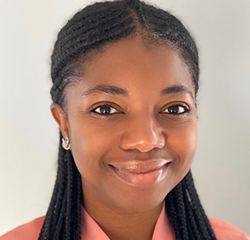
We’re kicking off Black History Month with Stephanie Durham-Rivera, a paralegal in MGC’s Raleigh office.
Raised in Rockford, Illinois, Stephanie Durham-Rivera was always negotiating a better deal as a kid, and never believed that “no” was a final answer. “My parents always said I was destined to go into the legal field,” she recalls. “I took their suggestion and ran with it.”
Encouragement and inspiration to join the legal industry came in a multitude of forms for Stephanie. “An early moment that shaped my future career was when I met Judge Rosemary Collins when I was in high school,” she says. “Judge Collins was the first woman judge of the Seventeenth Circuit Court in Illinois. We formed a good bond and she eventually allowed me to shadow her in her courtroom my senior year.” In Stephanie’s early years, Thurgood Marshall—the first Black justice of the Supreme Court—was a huge inspiration to her as well. “He argued so many important and pivotal cases during his career as an attorney; most famously Brown vs. Board of Education,” she adds.
Stephanie went on to study Political Science and Legal Communications at Howard University in Washington, D.C.—the same university where Marshall attended law school. “While at Howard, I interned at the Association of Trial Lawyers of America (now the American Association for Justice) and later with the Department of Justice’s Office of Consumer Litigation,” she says. Stephanie also joined the infamous Howard University Mock Trial Team, and in 2003, her team was named the Regional Champions and National Runner-Ups.
Today, Stephanie is a paralegal in MGC’s Raleigh office and largely involved in the legal community. She joined the North Carolina Bar Association (NCBA) in 2007, and was later recommended and nominated to become a member of the Paralegal Division Council. “Over the years I have held many positions within the Council including treasurer, secretary (twice), ethics chair, vice-chair and, now, chair. I was also the co-editor of the statewide North Carolina Paralegal Resource Binder,” Stephanie adds.
This year, as chair of the NCBA Paralegal Division, Stephanie has had the opportunity to implement several initiatives, including those related to diversity and inclusion. “Last month I announced the new formation of our Diversity and Inclusion Committee,” she says. “The goal is to identify and eliminate the barriers of the underrepresented within the paralegal community.”
“I think it starts with recruitment. Generally speaking, the legal industry tends to recruit from the same places. That lack of widespread recruitment leads to less diversity—not just with race, age, gender, disability or religion, but with sexual orientation, socioeconomic status, education, family/marital status, language and physical appearance, “ she adds. “That lack of diversity leads to a lack of understanding of other cultures, values and belief systems—not to mention a lack of new ideas and perspectives.”
Stephanie sees a second challenge as identifying and eliminating barriers that have previously prevented fair treatment, access and opportunity. “Tackling equity issues requires acknowledgement and an understanding of the historical barriers that caused these disparities within our communities,” she says. “With inclusion, I think it’s important that the legal industry works on creating environments in which underrepresented groups can be and feel welcomed, respected, supported and valued; not just to have a temporary seat at the table, but to maintain a diverse presence and participation.”
Stephanie also gives her time to a recently enacted wellness initiative at NCBA—an idea that was built to bring a focus on self-care during the pandemic. “We have been offering free monthly social events including cooking classes, yoga classes and painting classes to break up the monotony of our work day,” she says. On top of that, Stephanie is member of the Durham Chapter of National Council of Negro Women (NCNW), a social activism organization to lead, advocate and empower women of African descent, and is involved in the Oiselle Volée community, a running organization committed to representing a diverse group of athletic women and telling their stories. She has also been a program planner for several Continuing Paralegal Education (CPE) programs and a guest speaker in many paralegal studies classrooms.
Community and togetherness is undoubtedly a vital part of Stephanie’s life—a quality that she attributes to her late mother. “She was a teacher and a writer. She was also involved in and led many different organizations including the American Association of University Women (AAUW), the National Association for the Education of Young Children (NAEYC) and Alpha Kappa Alpha Sorority Incorporated,” she says.